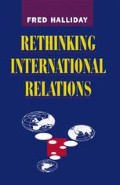Abstract
The purpose of this chapter is two-fold: to examine what is meant by the term ‘international’ and the confusion it occasions, and secondly to provide a brief account of the growth in the discipline, and the factors underlying this development. International Relations (IR) has occupied an uneasy, often marginal, place in the study and teaching of the social sciences. Yet its subject matter is, in the simplest terms, clear enough, comprising three forms of interaction — relations between states, non-state or ‘transnational’ relations across frontiers, and the operations of the system as a whole, within which states and societies are the main components. While they may vary in the stress they lay on each of these, all theories of the ‘international’ propose some explanation of each: indeed the major debates within IR revolve, to a greater or lesser extent, around these three dimensions and the primacy of one or the other.
Preview
Unable to display preview. Download preview PDF.
Notes
Robin Blackburn, The Overthrow of Colonial Slavery, 1776–1848 (London: Verso, 1988).
Ulrich Albrecht, Internationale Politik (Munich: Oldenbourg, 1986) ch. 9, ‘Das Demokratieproblem in der internationalen Politik’.
Hedley Bull, The Anarchical Society (Oxford: Oxford University Press, 1977); Fred Northedge, The International Political System (London: Faber & Faber, 1976).
Carl Schmitt, The Concept of The Political (New Brunswick, NJ: Rutgers University Press, 1975).
Robert Keohane and Joseph Nye (eds) Transnational Relations and World Politics (Cambridge, MA: Harvard University Press, 1971).
Kenneth Waltz, ‘The myth of national interdependence’ in Charles Kindelberger (ed.) The International Corporation (Cambridge, MA: MIT Press, 1970).
Stephen Krasner, Structural Conflict: The Third World Against Global Liberalism (Berkeley: University of California Press, 1985).
Robert Tucker, The Inequality of Nations (London: Martin Robertson, 1977).
Kenneth Waltz, Theory of International Relations (New York: Random House, 1979).
Author information
Authors and Affiliations
Copyright information
© 1994 Fred Halliday
About this chapter
Cite this chapter
Halliday, F. (1994). Introduction: The Pertinence of the ‘International’. In: Rethinking International Relations. Palgrave, London. https://doi.org/10.1007/978-1-349-23658-9_1
Download citation
DOI: https://doi.org/10.1007/978-1-349-23658-9_1
Publisher Name: Palgrave, London
Print ISBN: 978-0-333-58905-2
Online ISBN: 978-1-349-23658-9
eBook Packages: Palgrave Political & Intern. Studies CollectionPolitical Science and International Studies (R0)

